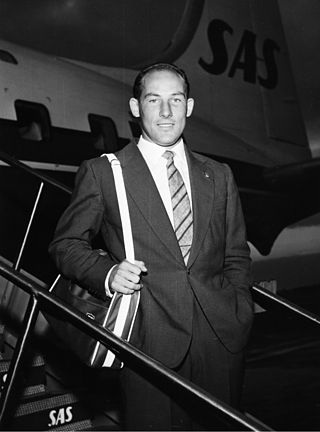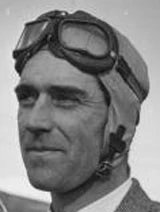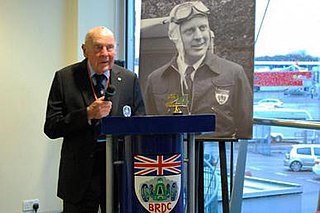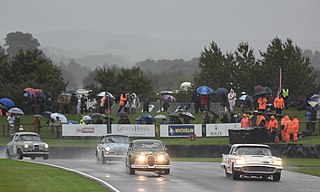
John Michael Hawthorn was a British racing driver. He became the United Kingdom's first Formula One World Champion driver in 1958, whereupon he announced his retirement, having been profoundly affected by the death of his teammate and friend Peter Collins two months earlier in the 1958 German Grand Prix. Hawthorn also won the 1955 24 Hours of Le Mans, but was haunted by his involvement in the disastrous crash that marred the race. Hawthorn died in a road accident three months after retiring. With a total of three career World Championship Grand Prix wins Hawthorn has the lowest number of Grand Prix wins scored by any Formula One World Champion.

Sir Stirling Craufurd Moss was a British Formula One driver. An inductee into the International Motorsports Hall of Fame, he won 212 of the 529 races he entered across several different motorsports competitions and he has been described as "the greatest driver never to win the Formula One World Championship". In a seven-year span between 1955 and 1961 Moss finished in second place four times and in third place three times.

José Froilán González was an Argentine racing driver, particularly notable for scoring Ferrari's first win in a Formula One World Championship race at the 1951 British Grand Prix. He made his Formula One debut for Scuderia Achille Varzi in the 1950 Monaco Grand Prix. His last Grand Prix was the 1960 Argentine Grand Prix.
George Edgar Abecassis was a British racing driver, and co-founder of the HWM Formula One team.

Peter John Collins was a British racing driver. He was killed in the 1958 German Grand Prix, just weeks after winning the RAC British Grand Prix. He started his career as a 17-year-old in 1949, impressing in Formula 3 races, finishing third in the 1951 Autosport National Formula 3 Championship.

Roy Francesco Salvadori was a British racing driver and team manager. He was born in Dovercourt, Essex, to parents of Italian descent. He graduated to Formula One by 1952 and competed regularly until 1962 for a succession of teams including Cooper, Vanwall, BRM, Aston Martin and Connaught. Also a competitor in other formulae, he won the 1959 24 Hours of Le Mans in an Aston Martin with co-driver Carroll Shelby.

James Duncan Hamilton was a British racing driver. He was famed for his colourful and extrovert personality, which often overshadowed his genuine talent. After fighting in, and surviving the Second World War, he took up motorsport. Although adept in single-seaters, sportscars was where he enjoyed most success, winning the 1953 24 Heures du Mans, two Coupe de Paris events, and the 12 heures internationals Reims race in 1956. He retired in 1958 and ran a garage in Bagshot, Surrey for many years. He died from lung cancer in 1994.

Major Anthony Peter Roylance Rolt, MC & Bar, was a British racing driver, soldier and engineer. A war hero, Rolt maintained a long connection with the sport, albeit behind the scenes. The Ferguson 4WD project he was involved in paid off with spectacular results, and he was involved in other engineering projects.

Peter Nield Whitehead was a British racing driver. He was born in Menston, Yorkshire and was killed in an accident at Lasalle, France, during the Tour de France endurance race. A cultured, knowledgeable and well-travelled racer, he was excellent in sports cars. He won the 1938 Australian Grand Prix, which along with a 24 Heures du Mans win in 1951, probably was his finest achievement, but he also won two 12 Heures internationales de Reims events. He was a regular entrant, mostly for Peter Walker and Graham Whitehead, his half-brother. His death in 1958 ended a career that started in 1935 – however, he was lucky to survive an air crash in 1948.

Reginald Harold Haslam Parnell Sr. was a racing driver and team manager from Derby, England. He participated in seven Formula One World Championship Grands Prix, achieving one podium, and scoring a total of nine championship points.

William Ronald Flockhart was a British racing driver. He participated in 14 World Championship Formula One Grands Prix, achieving one podium finish and won the 24 Hours of Le Mans sportscar race twice.
Alfred Graham Whitehead was a British racing driver from England. He participated in one Formula One World Championship Grand Prix, on 19 July 1952. He finished 12th, scoring no championship points. He also competed in several non-Championship Formula One races. He began racing his half-brother Peter's ERA, in 1951 and then drove his Formula Two Alta in the 1952 British Grand Prix. He finished second at 1958 24 Hours of Le Mans only weeks before the accident on the Tour de France in which Peter was killed. Graham escaped serious injury and later raced again with an Aston Martin and Ferrari 250GT before stopping at the end of 1961.
The British Racing Motors V16 was a supercharged 1.5-litre V-16 cylinder racing engine built by British Racing Motors (BRM) for competing in Formula One motor racing in the immediate aftermath of World War II. Designed in 1947 and raced until 1954–55, it produced 600 bhp (450 kW) at 12,000 rpm, although test figures from Rolls-Royce suggested that the engine would be able to be run at up to 14,000rpm.

Peter Douglas Conyers Walker was an English racing driver. He was born in Huby, Yorkshire and died in Newtown, Worcestershire. He proved a strong driver in most disciplines, but was most adept in sports cars, winning the 1951 24 Hours of Le Mans race, and the Goodwood Nine-Hours in 1955. He effectively retired after a crash in 1956 left him with serious injuries.

Eric David Thompson was a British racing driver, book dealer and insurance broker. He participated in sports car racing between 1949 and 1955 taking his greatest success by finishing third in the 1951 Les 24 Heures du Mans and took part in the 1952 RAC British Grand Prix.

The Maserati 4CL and its derived sister model the Maserati 4CLT are single-seat open-wheel Grand Prix racing cars that were designed and built by Maserati. The 4CL was introduced at the beginning of the 1939 season, as a rival to the Alfa Romeo 158 and various ERA models in the voiturette class of international Grand Prix motor racing. Although racing ceased during World War II, the 4CL was one of the front running models at the resumption of racing in the late 1940s. Experiments with two-stage supercharging and tubular chassis construction eventually led to the introduction of the revised 4CLT model in 1948. The 4CLT was steadily upgraded and updated over the following two years, resulting in the ultimate 4CLT/50 model, introduced for the inaugural year of the Formula One World Championship in 1950. In the immediate post-war period, and the first two years of the Formula One category, the 4CLT was the car of choice for many privateer entrants, leading to numerous examples being involved in most races during this period.

The Goodwood Revival is a three-day festival held each September at Goodwood Circuit since 1998 for the types of racing cars and motorcycles that would have competed during the circuit's original period—1948–1966.

The BRM Type 15 was a Formula One racing car of the early 1950s, and the first car produced by British Racing Motors. The car was fitted with a revolutionary and highly complex supercharged 1.5-litre British Racing Motors V16 which produced considerably more power than any of its contemporaries.

The 7th Goodwood Trophy was a motor race, run to Formula One rules, held on 25 September 1954 at Goodwood Circuit, West Sussex. The race was run over 21 laps of the circuit and was won by British driver Stirling Moss in a Maserati 250F. Peter Collins was second in a Vanwall and Roy Salvadori third in a 250F.

The 5th Richmond Trophy was a Formula Libre motor race held at the Goodwood Circuit, West Sussex on 6 April 1953. The race was won from pole position by Ken Wharton in a BRM Type 15, setting fastest lap in the process. Piero Taruffi in the Thinwall Special Ferrari 375 was second and Emmanuel de Graffenried third in a Maserati A6GCM.
















